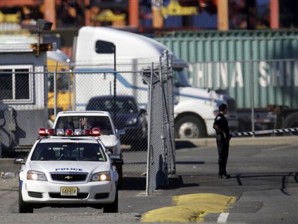NEWARK, New Jersey — Dock workers rushed to unload stacked containers from a cargo ship that arrived in New Jersey from the Middle East on Wednesday after a Coast Guard inspection team heard knocking for about two hours that suggested stowaways might be inside one of the boxes.

A police official stands near the entrance to a terminal at Port Newark, Wednesday, June 27, 2012, in Newark, N.J. The Coast Guard suspects there are stowaways in a container that was loaded on a ship. Coast Guard spokesman Charles Rowe says a boarding party heard sounds consistent with people coming from the container. The container was loaded aboard The Villa D'Aquarius in India. The manifest says the container was carrying machine parts to be unloaded in Norfolk, Va. AP/Julio Cortez
More than a dozen ambulances and law enforcement officials met the 850-foot (260-meter) Ville D’Aquarius when it docked early Wednesday at Port Newark, one of the busiest U.S. ports. Large mechanical cranes began unloading containers from the ship.
By midday Wednesday, all but one ambulance had quietly left the pier. By evening, authorities said officials had inspected 150 of the 200 containers authorities believe could be carrying people. The ship has 2,000 containers altogether.
The Coast Guard team had boarded the ship outside New York Harbor early Wednesday as the ship prepared to dock, Coast Guard spokesman Charles Rowe said. The officers were knocking on a bulkhead, or partition, of the ship as a routine security check and heard knocks back, he said, but they couldn’t pinpoint the source of the sound. The return knocks ended after about two hours, Rowe said.
The team followed protocol and didn’t open containers at sea in order to control the situation, he said.
Drew Barry, of the Sandy Hook Pilots Association, said he boarded the vessel about 20 miles (32 kilometers) offshore to help pilot it into port.
“There are at least 30 to 40 containers on top of the hatch cover, and I don’t know how many more below it,” Barry said. “If there are people down there, with no food and water for days, they’re probably pretty desperate by now.”
Shipping containers are steel boxes, usually 8 feet (2.4 meters) wide and 8- to 10-feet (2 to 3-meters) high and either 20- or 40-feet (6 to 12-meters) long, designed to withstand the rigors of the high seas and are strong enough to be stacked several high.
They normally can be opened only from the outside. There’s hardly any ventilation.
Rowe said it was taking about eight minutes to check each container — unloading it off the ship, opening it up and X-raying it if necessary.
The Department of Homeland Security, which was also involved in the investigation, said Wednesday night that its officers and agents were prepared to continue examining containers through the night.
The container ship, which a manifest said was carrying machine parts to Norfolk, Virginia, was loaded in India, he said.
The ship began its voyage May 30 in the United Arab Emirates, then made one stop in Pakistan and two stops in India. Its last port before Newark was in Egypt on June 15.
Speaking at an unrelated news conference, Andrew McLees, special agent in charge of Homeland Security investigations for U.S. Immigration and Customs Enforcement, said the ship’s origin and itinerary prompted the initial search.
“The routing of the ship and the ports of call was what led to the actions,” McLees said.
Michael Ward, the FBI’s top official in New Jersey, said the response was appropriate given the port’s vulnerability. The area is considered a prime potential target for terrorists.
“You’re going to get a response like this any time you have these types of facts,” Ward said. “It was an appropriate response which we did out of an abundance of caution.”
Shipping companies are legally responsible for keeping stowaways off their vessels, said Frank Atcheson, a maritime lawyer based in North Bergen, New Jersey. When stowaways are found, the companies are liable not only for fines but also must pay to house the stowaways where they are found and for secure transportation back to where they originated.
Between January 1998 and Dec. 16, 2011, more than 13,000 stowaways were found in more than 4,000 incidents around the world, according to the International Maritime Organization.
Some of the higher-profile discoveries of recent years: 22 Chinese men, all in good health, arrived in Seattle in 2006; 32 Chinese men, also in good health, were found in Los Angeles in 2005; eight people, most of them Turkish, were found dead along with five survivors in a ship in Ireland in 2001.
Associated Press writers Geoff Mulvihill in Haddonfield, New Jersey., and David Porter in Newark, New Jersey., contributed to this report.

